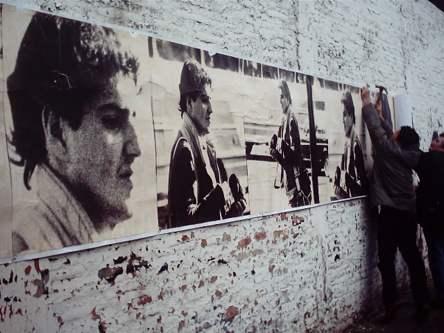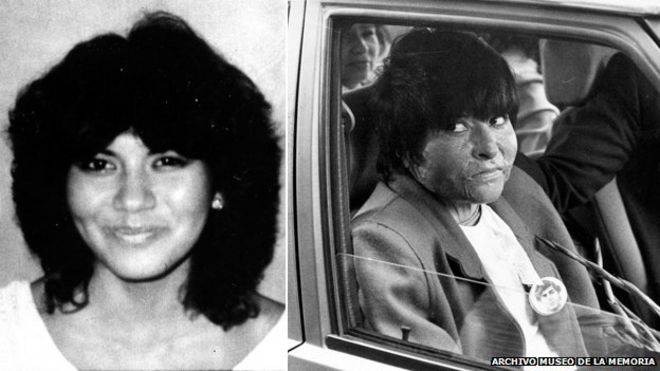Chile doubles down on prosecutions for Pinochet-era crimes
Source: Reuters
Chile doubles down on prosecutions for Pinochet-era crimes
Source: Reuters - Sun, 1 Nov 2015 19:25 GMT
By Gram Slattery
SANTIAGO, Nov 1 (Reuters) - For nearly three decades after Veronica de Negri's 19-year-old son Rodrigo Rojas was burned to death by Chilean soldiers during the dictatorship of Augusto Pinochet, her hunt for justice had been fruitless.
Two legal battles failed, as unsympathetic judges and amnesty laws foiled all attempts to bring charges.
But then in July 2015, she finally had a breakthrough. Cajoled by the Supreme Court president, prosecutors charged seven former military officers for burning de Negri's son alive while he was photographing a political protest in 1986.
"I wanted to scream to the world what was happening," said de Negri, who was told of the arrest warrants before they were served.
Read more: http://www.trust.org/item/20151101192658-gkjxo/
Wikipedia:
Background[edit]
Rodrigo Rojas was born in the port of Valparaíso, the son of Verónica DeNegri, a communist party activist. In 1976 at the age of 10, and after the Chilean coup of 1973, he was sent to live with relatives in Canada. Soon thereafter, his mother was arrested for political activities against the government of General Augusto Pinochet and later exiled. They were reunited and settled in the Washington D.C. area of the United States. There he attended Woodrow Wilson High School, and later studied photography. In 1986, Rojas-DeNegri, by then a young American photographer, decided to visit Chile for the first time since he had left for the exile.[citation needed]
Events of the case[edit]
During this time Chile was experiencing widespread political instability and human rights abuses. A national protest was organized for 2-3 July 1986. Rodrigo Rojas, who had been in the country for only six weeks, decided to try to participate and document the barricades that were going up in different areas of Santiago.[1]
At 8:00 am on 2 July 1986, he was among a small group of people that were setting up a barricade in the Los Nogales neighborhood, in the municipality of Estacion Central. According to the official report, endorsed and quoted at a speech by General Pinochet himself, the group was carrying five old tires, a molotov cocktail and a gallon of gasoline. They were intercepted by an army patrol that was clearing barricades in the area of General Velázquez Avenue. All escaped except for Rojas and Carmen Quintana, an engineering student at the University of Santiago. The patrol, under the command of Lieutenant Pedro Fernández Dittus, was composed of three officers, five noncommissioned officers, and 17 soldiers.[1]
There are two versions of the succeeding events: the first, which was officially endorsed and quoted by General Pinochet at a speech, states that as Quintana and Rojas were arrested by a military patrol, some of the molotov cocktails they were carrying broke, setting them on fire accidentally. The opposing version (of Quintana, the only survivor) alleges that both were severely beaten by military personnel, and later soaked with gasoline and set on fire.[citation needed]
After both were aflame and unconscious, patrol members wrapped them in blankets, loaded them into a military vehicle and drove them to an isolated road in the outskirts of Santiago, over 20 kilometers away. There, in an irrigation ditch, they were dumped and left to die. Some agricultural workers found them and notified the police, who then took them to a public hospital. Rodrigo Rojas' burns were fatal. He had second- and third-degree burns that covered 90% of his body, a broken mandible and broken ribs, and a collapsed lung. He lingered for four days after the incident, and died on 6 July 1986.[2]
https://en.wikipedia.org/wiki/Rodrigo_Rojas_DeNegri
[center]

Rodrigo, with his mother, Veronica de Negri



Carmen Quintana before (left) and after the attack (right) [/center]
Carmen Quintana: Set on fire by Pinochet's soldiers
By Mike Lanchin
BBC World Service
10 September 2013
Forty years ago, Gen Augusto Pinochet seized power in Chile - 17 years of military rule followed, during which thousands of people were tortured or killed. One woman who was doused with kerosene and set on fire, survived to tell the tale.
Carmen Quintana has one lasting image from the day, 27 years ago, when she and another young Chilean student were attacked, and set alight by soldiers during an anti-government protest.
"I just looked down at my blackened hands and at my burning clothes, and I suddenly saw myself in flames," she says. It was 2 July 1986, the first of two days of nationwide strikes in Chile against Augusto Pinochet's rule.
Eighteen-year-old Carmen was a serious young woman with thick bushy hair, from a left-wing family fiercely opposed to the Pinochet regime. From an early age she had gone with her parents on anti-government demonstrations - and had witnessed first-hand the repression meted out by the feared Carabineros, Pinochet's jackbooted police.
More:
http://www.bbc.com/news/magazine-24014543
Dont call me Shirley
(10,998 posts)For them, Chile, double-down triple-down.
forest444
(5,902 posts)Around 600 convictions since 2003, with another 400 or so on trial - and they did this over rabid, well-funded right-wing opposition.
Chile can too.
Kingofalldems
(38,461 posts)Conservative republicans.
forest444
(5,902 posts)Response to Judi Lynn (Original post)
Name removed Message auto-removed
ColesCountyDem
(6,943 posts)uppityperson
(115,677 posts)
Agony
(2,605 posts)Among the key revelations in the documents:
On September 12, eight days after Allende's election, Kissinger initiated discussion on the telephone with CIA director Richard Helm's about a preemptive coup in Chile. "We will not let Chile go down the drain," Kissinger declared. "I am with you," Helms responded. Their conversation took place three days before President Nixon, in a 15-minute meeting that included Kissinger, ordered the CIA to "make the economy scream," and named Kissinger as the supervisor of the covert efforts to keep Allende from being inaugurated. Since the Kissinger/Helms "telcon" was not known to the Church Committee, the Senate report on U.S. intervention in Chile and subsequent histories date the initiation of U.S. efforts to sponsor regime change in Chile to the September 15 meeting.
Kissinger ignored a recommendation from his top deputy on the NSC, Viron Vaky, who strongly advised against covert action to undermine Allende. On September 14, Vaky wrote a memo to Kissinger arguing that coup plotting would lead to "widespread violence and even insurrection." He also argued that such a policy was immoral: "What we propose is patently a violation of our own principles and policy tenets .… If these principles have any meaning, we normally depart from them only to meet the gravest threat to us, e.g. to our survival. Is Allende a mortal threat to the U.S.? It is hard to argue this."
As Secretary Kissinger prepared to meet General Augusto Pinochet in Santiago in June 1976, his top deputy for Latin America, William D. Rogers, advised him make human rights central to U.S.-Chilean relations and to press the dictator to "improve human rights practices." Instead, a declassified transcript of their conversation reveals, Kissinger told Pinochet that his regime was a victim of leftist propaganda on human rights. "In the United States, as you know, we are sympathetic with what you are trying to do here," Kissinger told Pinochet. "We want to help, not undermine you. You did a great service to the West in overthrowing Allende."
http://nsarchive.gwu.edu/NSAEBB/NSAEBB437/
Judi Lynn
(160,555 posts)Thank you for adding real information.
Our "news" media have buried it forever.